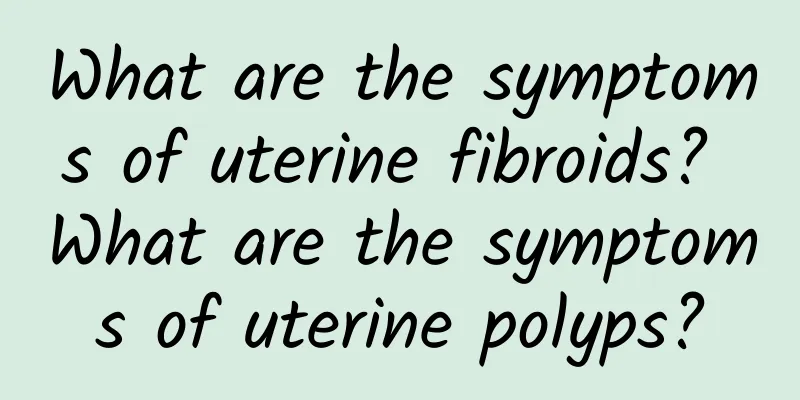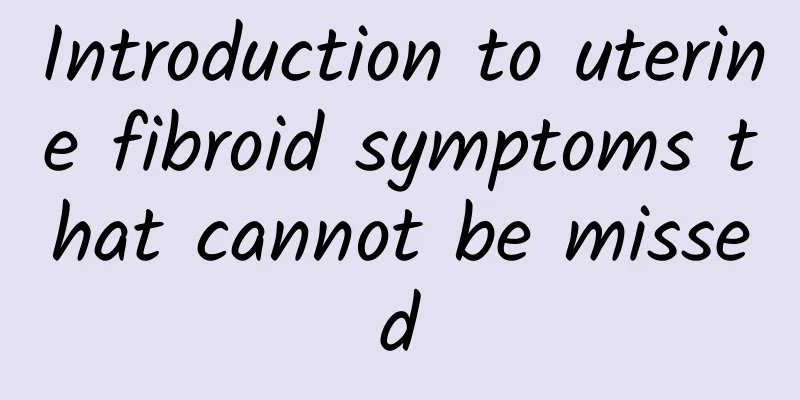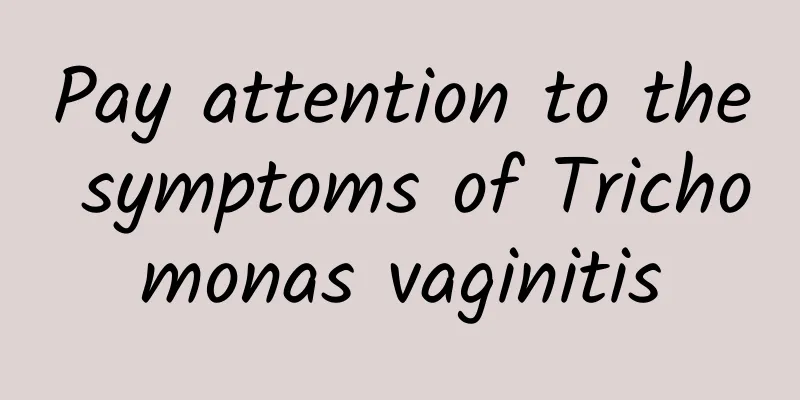What are the symptoms of uterine fibroids? What are the symptoms of uterine polyps?

|
Uterine fibroids and uterine polyps are common gynecological diseases that have a certain impact on women's health and quality of life. Understanding their symptoms is very important for early detection and timely treatment. This article will introduce the symptoms of uterine fibroids and uterine polyps in detail. What are the symptoms of uterine fibroids? Uterine fibroids are benign tumors that occur in the muscle layer of the uterine wall and are one of the most common tumors of the female reproductive organs. The symptoms of uterine fibroids vary, and the most common ones include: 1. Menstrual disorders: Uterine fibroids may cause abnormal menstrual cycles, increased or decreased menstrual blood volume, prolonged or shortened menstrual periods, and even irregular paroxysmal bleeding. Sometimes menstrual blood is mixed with blood clots and is darker in color. This is because the fibroids compress the endometrial blood vessels, resulting in poor bleeding. 2. Pelvic compression symptoms: Due to the presence of uterine fibroids, it may cause certain compression on the surrounding organs, causing corresponding symptoms. For example, bladder compression can cause frequent urination and urgency, while rectal compression may cause constipation or anterior rectal prolapse. 3. Lower abdominal discomfort: The growth of uterine fibroids can cause the uterus to enlarge and also cause some discomfort in the abdominal cavity. Many patients will feel heaviness, distension or dull pain in the lower abdomen, especially during menstruation or after standing for a long time or overwork. 4. Infertility: Uterine fibroids are also a common cause of infertility. Fibroids may affect embryo implantation, leading to implantation failure, miscarriage or even infertility. What are the symptoms of uterine polyps? Uterine polyps are benign growths that protrude from the endometrium and form in the uterine cavity. Although most uterine polyps do not cause obvious symptoms, in some cases, they may cause the following symptoms: 1. Vaginal bleeding: Uterine polyps are one of the common causes of paroxysmal vaginal bleeding. This bleeding usually occurs after the end of menstruation, with irregular bleeding of small amount and short duration. 2. Irregular menstruation: The presence of uterine polyps will interfere with the normal physiological excretion of the endometrium. Therefore, patients may experience symptoms such as irregular menstruation, prolonged menstruation or intermittent bleeding. 3. Lower abdominal pain: The growth and irritation of uterine polyps may cause pain or discomfort in the lower abdomen. Patients may feel dull pain, heaviness or distension in the abdomen, sometimes accompanied by a sore and swollen feeling in the lower abdomen. 4. Infertility: Similar to uterine fibroids, uterine polyps may also cause infertility by hindering embryo implantation or interfering with the intrauterine environment. In summary, both uterine fibroids and uterine polyps may cause some discomfort or symptoms in the female reproductive system. However, these symptoms do not necessarily exist in every patient. For some asymptomatic and slow-growing fibroids or polyps, immediate surgical treatment may not be required. But if the symptoms or discomfort seriously affect the patient's quality of life, it is recommended to seek medical attention as soon as possible and undergo further examination and treatment. At the same time, regular gynecological routine examinations are also important for the early detection and treatment of uterine fibroids and uterine polyps. |
<<: What should you not eat after an abortion? What should you eat after an abortion?
>>: What should you not eat after an abortion? What is the best thing to eat after an abortion?
Recommend
Is ectopic pregnancy hereditary?
Will ectopic pregnancy be inherited? Many people ...
What drugs are used to treat menopause?
Every woman will face desperate situations. Women...
Diagnosis of vaginitis requires a medical examination and pathogen testing
Diagnosis of vaginitis includes two aspects: dete...
Always pay attention to the dangers of ectopic pregnancy
In recent years, the harm of ectopic pregnancy ha...
Foods that are good for premature ovarian failure
For women, ovarian health is an important indicat...
What to do if your period is delayed
What should I do if my menstruation is delayed? D...
What are the misunderstandings of women in treating cervical erosion? Women should be careful to avoid falling into two major misunderstandings when treating cervical erosion.
In daily life, many women will rush to seek medic...
What are the causes of irregular menstruation in adolescent girls?
Do you know what are the reasons for irregular me...
What is the difference between uterine fibroids and ovarian cysts? Three major differences are worth noting
What is the difference between uterine fibroids a...
Experts explain the causes of ovarian cysts
Ovarian cysts can cause great harm to female frie...
Abortion! Who is suitable for it?
Do you know that abortion is also called artifici...
Don’t be NG with the crazy facial mask! 4 major pitfalls of applying facial masks
It is well known that Taiwanese women love to app...
Polycystic ovary amenorrhea pregnancy
Pregnancy after amenorrhea in patients with polyc...
What is the reason for menstruation after menopause?
What happens when menstruation comes back after m...
Can almonds cause miscarriage? What dietary taboos do pregnant women need to pay attention to?
Almonds are rich in nutritional value. The VE con...









